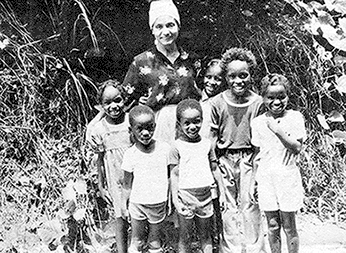
Alabama's Black Belt:
Legacy of slavery, sharecropping
and segregation
By Consuela Lee
Snow Hill, Ala.
"We are expecting the lowest scores (Stanford Achievement Test) to come from predominantly Black schools in the Black Belt."
- Ed Richardson, Alabama State Superintendent of Education (2000)
I was 12 years old when I silently vowed to return home to Snow Hill, Ala., in Wilcox County, after I finished college to help educate children. As a young person I was concerned that I was miles ahead of my schoolmates in basic academic skills and general knowledge. Most of my classmates were children of sharecroppers and were needed by their parents to help sow and gather crops. Consequently the school year was well underway when these students reported to class.
I returned home in 1980 to revitalize my alma mater, Snow Hill Institute, founded and built by my grandfather, William J. Edwards. The school was started in 1893; it had been closed in 1973 because of a desegregation edict.
Edwards, born on the R.O. Simpson Plantation in 1868, survived a childhood of abject poverty and illness. He attended Tuskegee Institute where, during his senior year, he registered for a class taught by Booker T. Washington. Dr. Washington exhorted his students, upon graduation, to go back home and help elevate the social status of Black people through education and vocational training.
Edwards did just that--and with the help of Tuskegee Institute and Dr. Washington bought close to 2,000 acres of land, rich in timber, for an excellent boarding school for Black youth, grades 1-12.
The school began to decline after Edwards' principalship ended in 1925. By 1973, it had lost its great purpose and academic excellence. The state of Alabama had taken charge of the academic programs in 1927.
During the summer of 1980, 45 children registered for music classes at Snow Hill Institute for Cultural Arts and Heritage. My goal was to reopen the school as an arts and educational facility. At first, I could not understand the dialect the children were speaking. Educationally, the children could not answer simple questions nor clearly say their names. There still exists today serious neglect in the state of Alabama's obligation to educate and protect our children!
In fact, the state government cares more about the economic interests of the corporations that are exporting timber out of Wilcox County and elsewhere at record numbers without paying restitution to the Black residents who live on the land.
According to a recent series of articles in the Birmingham News, Wilcox County has one of the highest percentages in the categories of poverty and infant mortality, poor education, a high rate of poor, single mothers, and inadequate health care and unemployment in Alabama. The News series labeled Wilcox County and other Black Belt counties "Alabama's Third World." (Download http://www.al.com/specialreport/ birminghamnews /?blackbelt.html)
Slavery, sharecropping and segregation are the shameful hallmarks of the history of this area. In his book "Twenty-Five Years in the Black Belt," Edward cites: "In the 1920s and 1930s, Black children were allotted 35 cents per child for education while white children received $15 per child."
"Keep 'em ignorant!" is the battle cry of those who control Black Belt schools. I came to the sad conclusion, long before the News articles were printed, that there is a carefully planned death sentence for Black children.
This genocidal policy is sponsored by the state of Alabama, abetted by school administrators and school boards. This policy includes poorly trained teachers, unworkable computers, libraries stocked with books seldom used and months wasted teaching "how to pass" the SATs. There are very few, if any, ongoing music or other arts classes.
This death sentence accelerated with the closing of Snow Hill Institute, a national historic site that had the glorious history of academic achievement plus the indomitable and lasting spirit of a Black man who not only built an educational landmark but brought his people out of the bondage of sharecropping into the independence of landownership.
The state of Alabama, and the corporate timber interests it is subservient to, have kept the Black community in semi-slavery conditions. Reparations must be paid for the crimes committed against the multi-generations of Black people in Alabama's Black Belt.

Consuela Lee with her muscic students,
Snow Hill 1980s